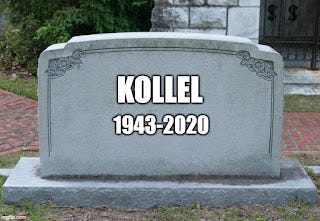Kollel, 1943-2020

As I discussed in my monograph "The Making of Haredim," the modern concept of the kollel began in 1943. There was the Kovno Kollel and others that began in the nineteenth century, but they were rabbinic training schools, with a program lasting three to five years.
In marked contrast to all these was the type of kollel first established by Rav Aharon Kotler in 1943, in Lakewood. There was no time limit placed upon studying there, because its purpose was fundamentally different from all those kollels that preceded it. Its goal was to have the study of Torah being performed “for its own sake,” as per the innovative definition of Rabbi Chaim of Volozhin. The students were specifically not to be preparing for a role in the rabbinate or the wider community. But the wider community was expected to provide financial support for this and similar institutions, based upon the new concept of the innate value of the Torah study.
The ultimate step in the evolution of the kollel, which spread in the latter part of the twentieth century, was its presentation as an expectation of every young man in the charedi community. In more moderate charedi circles in the United States, this is only expected for a year or two following marriage, while in the rest of charedi society in the US and Israel it is expected to continue for at least a decade or two, if not indefinitely. This is enabled by philanthropy in combination with government welfare.
Of course, such a system is not financially viable on a large scale for a long period. But Covid-19 accelerates its crash.
For many months now, unemployment in Israel has been around a shocking 20%, with nearly one million people unemployed. The economic aid is hundreds of billions of shekels, and the pandemic is not even over yet. The government is just not going to have the funds to help the voluntarily unemployed. And with Bibi's days being numbered, the charedim will lose a lot of political power, which is what they need to extract money from the rest of the country.
Meanwhile, the funds being donated by Jews in the Diaspora are also drying up. I'm on a mailing list for nonprofit fundraising and the message is very straightforward and bleak: Crisis. My own fundraising for the Biblical Museum of Natural History - an institution that our donors very much appreciate - has been immensely challenging this year. Most people just don't have the kinds of funds that they used to have.
I'm not predicting that every kollel is going to immediately shutter its doors. But there is a crisis the likes of which is unprecedented, which will gradually force many people to have to leave kollel and search for a job - in numbers that will (hopefully) force a large-scale charedi rethink of the entire kollel-for-all concept.
But these people leaving kollel will find themselves competing for jobs with hundreds of thousands of others desperate for employment. Tragically, the people leaving kollel and searching for a job have no secular education and not much in the way of marketable skills. The price and suffering will be severe. One can only bemoan the systematic ignoring of Chazal's dictum that parents have the responsibility to educate their children with the ability to earn a living.
As I've been warning for years: the longer this broken system is propped up, the greater the crash when it finally inevitably collapses. Perhaps it's for the best that it's collapsing even sooner than I anticipated.


